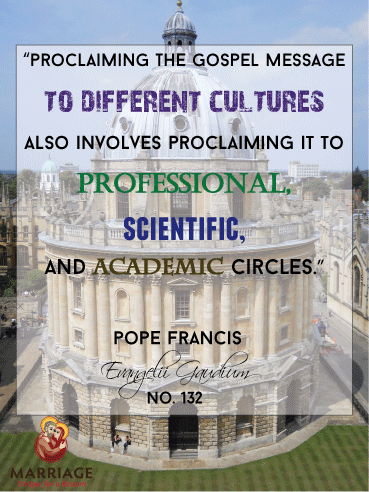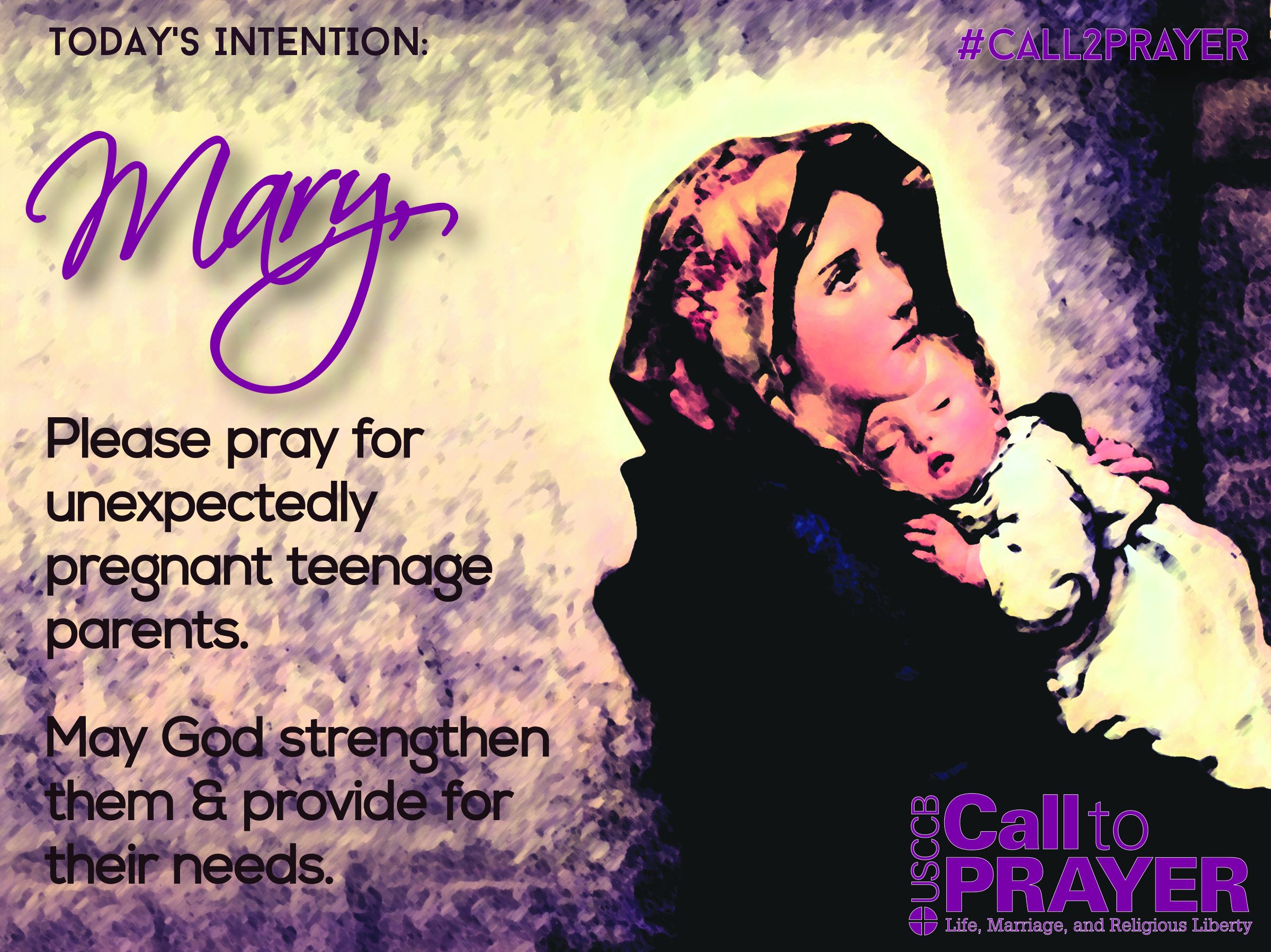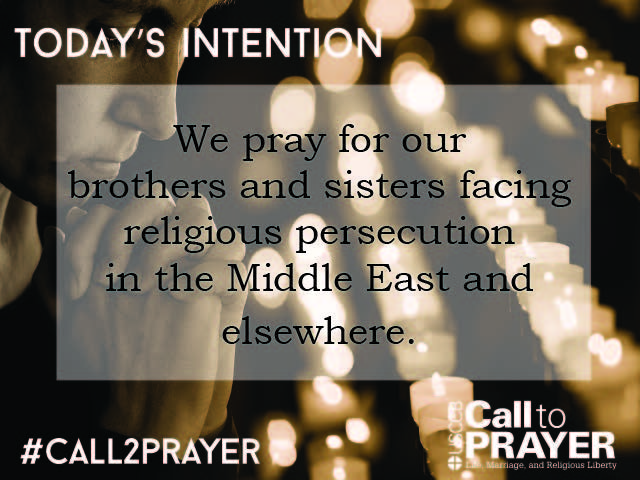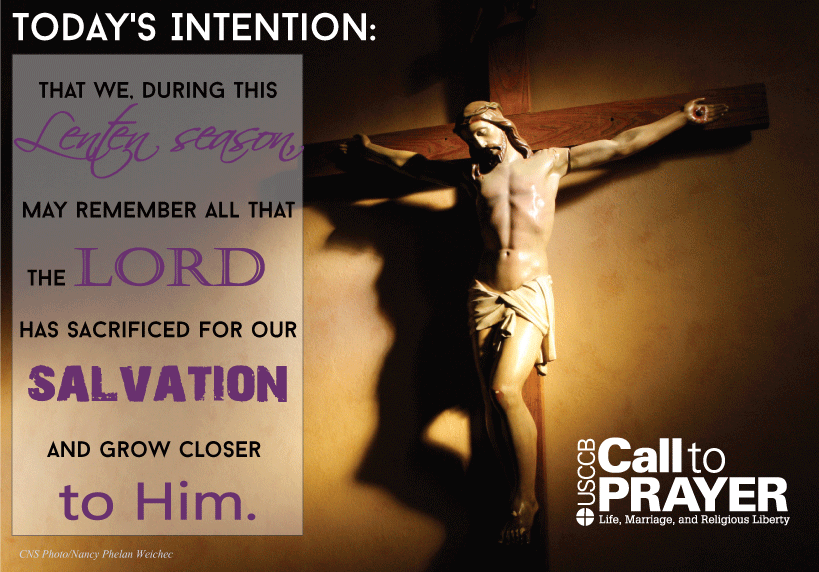March for Marriage: April 25, 2015
 Bishop Malone and Archbishop Cordileone have once again invited and encouraged the Bishops and the faithful to take part in the March for Marriage on April 25, 2015, three days before the U.S. Supreme Court hears oral arguments on the constitutionality of states’ preserving the legal definition of marriage as the union of one man and one woman.
Bishop Malone and Archbishop Cordileone have once again invited and encouraged the Bishops and the faithful to take part in the March for Marriage on April 25, 2015, three days before the U.S. Supreme Court hears oral arguments on the constitutionality of states’ preserving the legal definition of marriage as the union of one man and one woman.
Writing to the U.S. bishops, these two Chairmen wrote, “The March will be an opportunity to stand for the good of marriage in our nation, to pray for our Supreme Court justices, and to demonstrate our commitment to the well-being of children. It complements well the bishops’ Call to Prayer for Life, Marriage, and Religious Liberty (www.usccb.org/pray). The anticipated decision of the Supreme Court positions itself to be the most important judicial ruling in our nation since the infamous Roe v. Wade decision declaring a constitutional right to abortion. The March is an important witness to a movement dedicated to building a culture of marriage and the family, and it serves to remind all people that a Supreme Court ruling will not decide the issue of marriage any more than Roe decided the issue of abortion. We are deeply grateful for any support you can offer for this March.”
Archive
Call to Prayer: March 27
Archive
Call to Prayer: March 20, 2015
Archive
An Ear to the People: Evangelii Gaudium, Marriage and Family
 Lessons from Evangelii Gaudium #10
Lessons from Evangelii Gaudium #10
Pope Francis’s Apostolic Exhortation on the proclamation of the Gospel in today’s world, Evangelii Gaudium or “The Joy of the Gospel,” has many points that are relevant to the work of Marriage: Unique for a Reason. This series will explore some of these themes and apply Pope Francis’s words to the culture of marriage and family in the United States.
An Ear to the People (no. 154-155)
In the preceding sections of Evangelii Gaudium, the Holy Father turned his mind to the challenges of preaching homilies that reach the people. In this section, he encourages a priest to, “keep his ear to the people and to discover what it is that the faithful need to hear” (no. 154). In contemplating the Biblical text and prayerfully preparing words for a given Mass, the priest is asked to keep in mind the actual people before him; their language, culture, formation, and journey. He advocates for a “profound sensitivity” to what the people are going through, noting that, “we should never respond to questions that nobody asks” (no. 155).
While Pope Francis wrote this section for priests and bishops who address the faithful through formal preaching, it is also applicable to family life. Parents as the primary educators of their children are called to a similar thoughtful discernment and sensitivity to what they may need to hear at a given time. As events arise inside and outside of the family, parents must determine what and how to share news with their children in ways that are appropriate to their age and temperament.
How “in tune” are you to what is going on in your children’s lives? Are you confident that you are actively seeking to guide them with the help of the Holy Spirit?
Archive
Call to Prayer: March 13, 2015
Bishops’ Statement: www.bit.ly/CTP310
Archive
Cardinal Wuerl: Silencing the Church’s Voice
 On March 2, Cardinal Wuerl sent out an email to his people about being courageous in the face of the government’s increasing encroachment on religious freedom.
On March 2, Cardinal Wuerl sent out an email to his people about being courageous in the face of the government’s increasing encroachment on religious freedom.
He writes, “We are being told that in our schools, social service ministries and other Church programs we may not insist that those who teach the Catholic faith and carry out Catholic ministry should do so in word and the manner they live their lives.”
The two laws the Cardinal draws our attention to are:
- The Reproductive Health Non-Discrimination Act of 2014 (RHNDA) which would deprive the Church of its right to ensure that those whom it entrusts to carry out its mission are faithful to its teachings on human life and sexuality, and
- The Human Rights Amendment of 2014 (HRAA) which would require Catholic schools to formally recognize, endorse, and support student groups dedicated to promoting homosexual behavior.
The Cardinal connects all of this activity back to Lent, writing, “This Lent we all need to ask ourselves if we are prepared to stand up for our beliefs and to speak up on behalf of our schools, parishes and charities.”
Archive
Evangelii Gaudium Part 9

Lessons from Evangelii Gaudium #9
Pope Francis’s Apostolic Exhortation on the proclamation of the Gospel in today’s world, Evangelii Gaudium or “The Joy of the Gospel,” has many points that are relevant to the work of Marriage: Unique for a Reason. This series will explore some of these themes and apply Pope Francis’s words to the culture of marriage and family in the United States.
Culture, Thought and Education (paragraphs 132-134)
Pope Francis writes that “Proclaiming the Gospel message to different cultures also involves proclaiming it to professional, scientific and academic circles” (no. 132). It may be tempting to leave the towers of academia untouched by our missionary efforts, but this would be a mistake. Pope Francis encourages us to develop a “creative apologetics”; a way of demonstrating the interaction of faith and reason and particularly the question of credibility.
St John Paul II wrote an encyclical about Faith and Reason (Fides et Ratio) in 1998. In it, he pointed out that, “the desire for truth is part of human nature itself” (no. 3). There is a certain sense in which this desire for truth is played out in a particularly strong way in “intellectual” circles. There is an almost- separate culture to academia or the professional and scientific world, which means that there is likewise a particular way of sharing the Gospel with those in them. Every authentic culture is open to revelation. As John Paul II put it, “This simple statement contains a great truth: faith’s encounter with different cultures has created something new” (no. 70). Christians who are immersed in professional, scientific and academic circles have a unique calling to call forth the desire for truth from their colleagues and to challenge any assumptions that are in conflict with it.
One of the most simple, yet eloquent ways of living the Gospel in a professional context is showing by one’s life that one’s family takes precedence over professional achievement or monetary gain. A priest who is one of many children told the following story: One day as a teenager, he accompanied his father to the hospital where his father worked, and noted the many BMWs and Lexus’s in the parking lot. He asked whether his dad was embarrassed driving a clunky van—his dad replied that his family was far more important to him than his car. This man’s faith and priority on family is a concrete witness within a professional context.
Archive
Call to Prayer: March 6, 2015
Archive
World Meeting of Families Catechesis Series: Chapter Five
 World Meeting of Families Catechesis Series
World Meeting of Families Catechesis Series
The USCCB Secretariat of Laity, Marriage, Family Life and Youth is excited about the World Meeting of Families (WMOF) being held in Philadelphia in September 2015. We are presenting a series of short articles focused on the WMOF Catechesis Love is our Mission: The Family Fully Alive and its implications for our daily lives. We will follow the timing suggested by the Archdiocese of Philadelphia by exploring one theme each month leading up to the World Meeting. The Archdiocese for Military Services has also published reflections, and Chapter 5 is linked here.
Parenting with the Strength of God
Tim Roder
Secretariat for Laity, Marriage, Family Life and Youth
“Parenting is demanding” (no. 79). I don’t know anyone who would disagree with this statement. In fact a typical response, even from an adolescent, would be, “No kidding!” As a parent (father), of many children, the word “demanding” often seems like an understatement. Parenting is not for the faint of heart, nor is marriage. Marriage and children are great gifts, and can bring untold joy, yet they do not come without their challenges. St. Francis de Sales wrote: “The state of marriage is one that requires more virtue and constancy than any other: it is a perpetual exercise of mortification.” Of course I do not want to dis-sway anyone from getting married and having children, but I think it is good to be aware before going into it. Before you get married, you should humbly recognize that you and your future spouse cannot make marriage work all on our own, but instead see that “with God all things are possible” (Mt 19:26). Christian marriage and family life is about being open to “God’s grace in daily life … even in the midst of fatigue and domestic chaos” (no. 79). It is indeed in those very moments, of the ordinary, mundane, little, and the seemingly insignificant circumstances of life, that we as parents are able to experience “divine love” in a way that is unparalleled.
My wife and I had two children, and greatly desired another. After several months of “trying,” we were elated with the wonderful news that my wife was pregnant. This elation was soon replaced with intense anxiety from numerous threats of miscarriage. My wife was put on bed rest for the first three months because that seemed to be the only way to maintain the pregnancy. It was a stressful time for me, balancing care for her and our two young boys, keeping the house relatively clean, and working full time. But all of this became grace-filled. Those months, and others like them, served as a constant reminder to me and my wife that, as St. Paul taught, “When I am weak, then I am strong” (2 Cor 12:10). I found myself often meditating on the preceding verse, “My grace is sufficient, my power is made perfect in weakness” (2 Cor 12:9). I knew that I could not do it on my own. As an imperfect parent I certainly “need help and strength from God, family, parish, and friends” (no. 80). My wife and I received this aid through great outpourings in the least expected ways, from meals to babysitting to—my favorite—friends who cleaned our home for us. These memories are treasures we share with our children and hope they pass on to theirs. How will you allow your domestic routine and life be “places were the Spirit shines through” (no. 80)?
Eventually my wife was taken off bed rest, the pregnancy progressed nicely and we were blessed with the birth of our third son—who had to be induced, somewhat ironically, two weeks past his due date.
Archive
Evangelii Gaudium, Marriage and Family: Part Eight
Pope Francis’s Apostolic Exhortation on the proclamation of the Gospel in today’s world, Evangelii Gaudium or “The Joy of the Gospel,” has many points that are relevant to the work of Marriage: Unique for a Reason. This series will explore some of these themes and apply Pope Francis’s words to the culture of marriage and family in the United States.
Person to Person
Every day, Pope Francis says, we are responsible for a kind of simple “informal preaching” to our family, friends and neighbors (no. 127). Sharing the love of Christ with them is our mission. The Holy Father points out that in dialogue, listening is the first step, “when the other person speaks and shares his or her joys, hopes and concerns for loved ones, or so many other heartfelt needs” (no. 128). It is when a person is listened to and respected that they may be open to hearing God’s word from one who is humble and “always willing to learn, in the awareness that the message is so rich and so deep that it always exceeds our grasp” (no. 128).
Christians do not approach others with all the answers. We do not have neat, simple formulas to solve the world’s problems. Our message must never be reduced to platitudes. What the Church has is the message of love and mercy: a God who became man; who suffered, died, and rose again for us. There are as many ways of sharing this message as there are human beings.
Pope Francis focuses on the simple person to person encounters that happen every day. Christians are reminded by this to pay attention to the opportunities of the present moment, the here-and-now. This can be undermined in some ways by too strong a reliance on technology or social media for communication. Technology should be in the service of human relationships, not in replacement of them. There are many reflections on this, even in our own culture, that are worth thinking about. The Holy Father also reflects on this when he addresses the media for World Communications Day every year. He reminds us, “The desire for digital connectivity can have the effect of isolating us from our neighbors, from those closest to us” (“Message for the 48th World Communications Day”).
This week, can your family make a special effort to connect with others in your community? Can you start a conversation about something meaningful by the soccer field, or invite an elderly neighbor for dinner?



